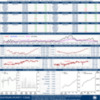Lol
The true special person is the one who runs with the herd, and turns before the edge of the cliff, which is why over the last couple of years I was always asking A/Prof when he thought it was going to end. If I could have my time over again, THIS is what I would be trying to learn, is the psychology around the herd mentality of investing, and how to spot the initial turning points with greater accuracy (as most people who have been investing successfully for at least 15-20 years can probably see some signs earlier than the people whose money they will be receiving)
MW
Hi MW,
Have you read "The Big Short" by Michael Lewis? It is an absolutely fascinating account about the guys who went against the herd. The psychological strains on Paulson and Burry were intense as they waited for their bets to come right.
Cheers




